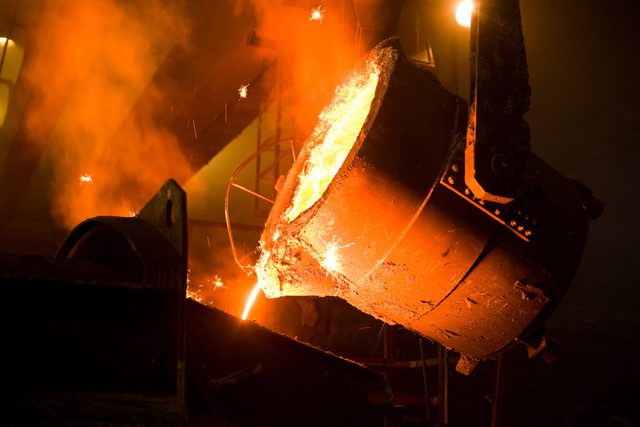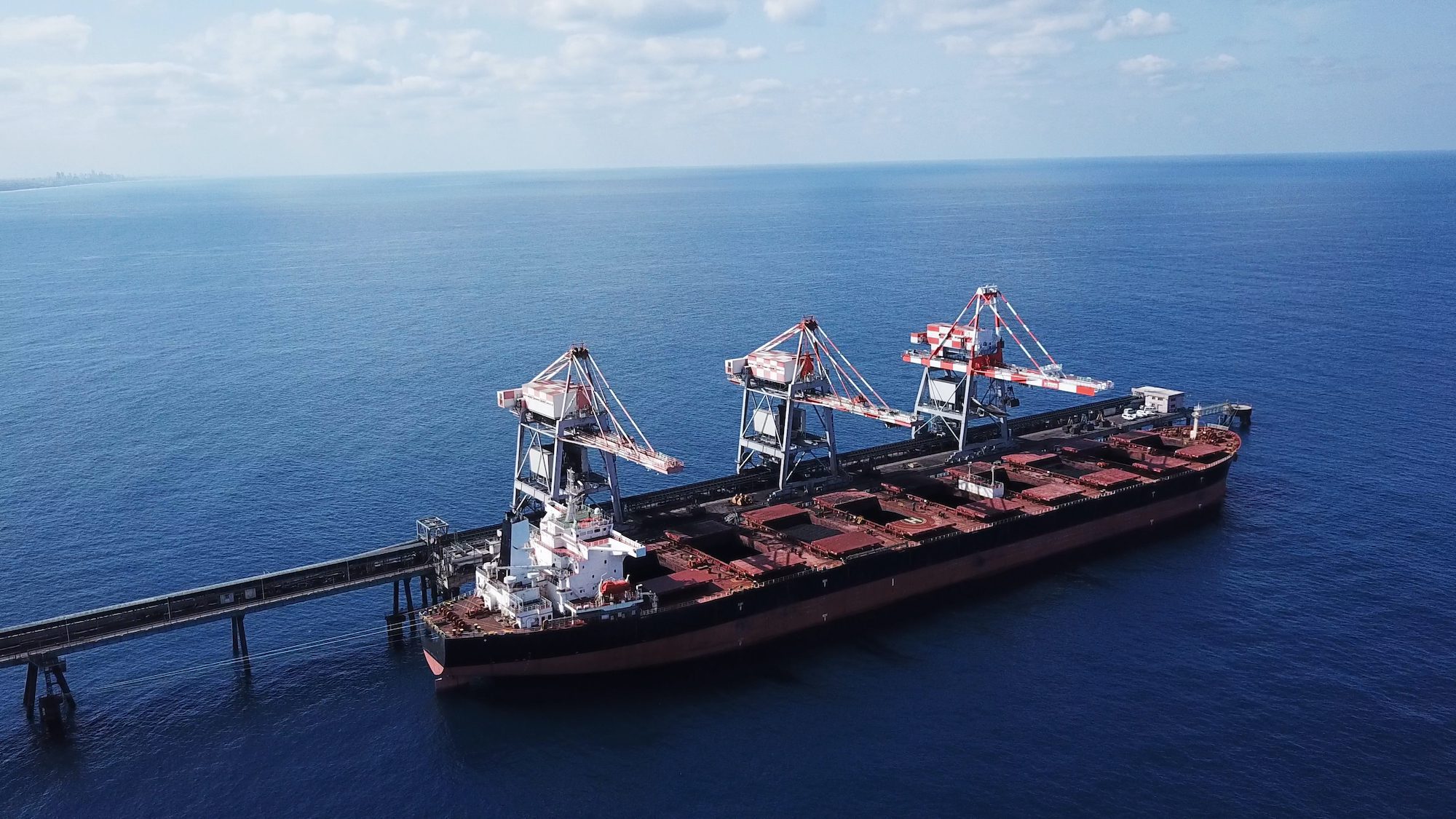June 3 (Bloomberg) — Since Indonesia banned ore exports, the global nickel industry has been rocked by surging prices, Chinese workers like Zhang Qi Guang are building smelters in Sulawesi and business at Eva’s Jewel restaurant has collapsed.
Indonesia, the world’s largest producer of mined nickel, halted shipments Jan. 12, sending prices up as much as 56 percent and prompting Morgan Stanley to forecast a global output deficit over the next five years.
The government’s rationale for the ban was that too much wealth was leaving the country because the raw ore is worth far less than refined metal. It figured the world would come to its doorstep to build smelters that extract nickel from the red earth. While some of those investments have begun, the downside is idle mines, tens of thousands of lost jobs and piles of unwanted ore waiting to be processed. Sales at Eva’s Jewel in the town of North Konawe fell as much as 80 percent.
“You never get the sweet thing unless you eat the bitter thing,” said Alexander Barus, vice president of PT Sulawesi Mining Investment, a joint venture of Jakarta-based Bintangdelapan Group and Chinese steelmaker Tsingshan Holding Group, which is building two smelters on Sulawesi. “We feel sad about the people, but just you wait two or three years.”
Production Deficits
The ban’s impact on the nickel market was akin to how oil buyers might respond to a halt in supplies from Saudi Arabia, the top exporter, Citigroup Inc. said on May 21. Global mined output will drop 21 percent to 1.8 million tons in 2014, including an 82 percent plunge in Indonesia to 113,000 tons, according to Morgan Stanley. Demand for refined metal will exceed production from next year until 2019, the bank said.
Nickel, used mostly for corrosion resistance in stainless steel, has rallied 39 percent this year to $19,350 a metric ton on the London Metal Exchange, after prices on May 13 touched $21,625, the highest since February 2012.
Sulawesi, the sprawling k-shaped island traversed by the equator, has more than 72 percent of Indonesia’s mineable nickel reserves, according to the Geology Agency. Before the curb, mandated by the Mining Law of 2009, companies stripped the forest to uncover earth that contained about 1.8 percent nickel. The dirt was trucked to the coast, loaded onto flat-bottomed barges and transferred to ocean-going vessels.
Chinese Investment
China was the biggest ore buyer, so the ban has increased the appeal of investing in Indonesian smelters. Sulawesi Mining’s partners, Jakarta-based mine owner Bintangdelapan and steelmaker Tsingshan, which used to import ore from the island, are already at work on $1.8 billion of projects in Morowali Regency, Central Sulawesi province.
“We’ve already done this in China,” said Zhang, the deputy site manager for the Sulawesi Mining project, who moved to the island from China. The plants, constructed from parts shipped in by Tsingshan before the export ban began, are being assembled by hundreds of local and Chinese workers.
The first smelter and a coal-fired power plant will be completed by December or in the first quarter at a cost of $672 million, Sulawesi Mining President Director Hamid Mina said. Furnaces will transform ore with about 1.8 percent nickel into ingots or granules of nickel pig iron, known as NPI, with 10 percent metal. At full capacity, it’ll produce 300,000 tons a year, or the equivalent of 30,000 tons of pure nickel.
“This is the factory that we need to have in Indonesia instead of exporting ore to other countries,” Mina said in the shadow of the half-finished smelter taking shape in a jungle clearing. “Now after the ban everybody will build it here.”
More Planned
The second plant, a $1.1 billion project backed by Sulawesi Mining and three other investors, will yield the equivalent of 60,000 tons of pure nickel and should be completed by the end of 2015, Barus said. A third smelter is under study, as well as an industrial park with stainless-steel mills and private airport.
To the south, PT Macika Mineral Industri, a joint venture between PT Macika Mada Madana and China-based Ningbo BrilliMetal Co., is investing $15 million in a blast furnace in Palangga, South Konawe. Set to start in the first quarter of 2015, the plant will produce 18,000 tons of NPI with about 10 percent nickel, said Ramli Halim, director at PT Macika Mineral.
While smelter investments are occurring, it may take years to replace the material the ban removed from the global market. Along the rugged, palm-fringed coastline between the Morowali smelters’ building site and the local center of Bungku, mining concessions lie idle and orphaned piles of raw ore sit by makeshift jetties.
Lost Jobs
Sulawesi Mining is the only company that’s started work on facilities in the immediate area, according to Morowali Regent Anwar Hafid, the government official who oversees the lives of the 120,000 people in the area. The ban triggered about 15,000 direct job losses at mines and has hurt the local economy, said Anwar, who dispatched officials to the ports in January to see that shipments were halted.
“It is a long-term hope that something can be achieved,” Anwar said in an interview in his office. “In the short term, it’s affected the community: there are no jobs and businesses that supported mining have also stopped.”
Across a spine of mountains on the mud-filled road that leads from Morowali toward Kendari, capital of the neighboring Southeast Sulawesi province, business at Eva’s Jewel has plummeted after mining stopped. Daily takings fell from 4 million to 5 million rupiah ($432) to sometimes less than 1 million, said Rasna, the owner, who uses a single name.
Fewer Orders
“Before, sometimes we were overwhelmed with the orders,” Rasna said in an interview at the restaurant, which is decorated with framed butterflies and serves squid, chicken and noodles. “I hope that the mining will resume soon.”
Sulawesi Mining anticipated the ban, drawing up and then expanding its smelter plan early last year as it saw that the government wouldn’t flinch, according to Mina, who used to join his surveying crews more than half a decade ago as they trekked through the jungles to chart the best grades of ore. Mining may begin again in about October to accumulate the raw material that’s needed for first smelter’s operation, he said.
“The world has to adjust,” said Barus, the Sulawesi Mining vice president who’s tackling the smelter project after a career that includes the civil service, a stint as a diplomat and work as a coal-mining executive. “Be patient.”
Editorial Standards · Corrections · About gCaptain
This article contains reporting from Bloomberg, published under license.

 Join The Club
Join The Club











